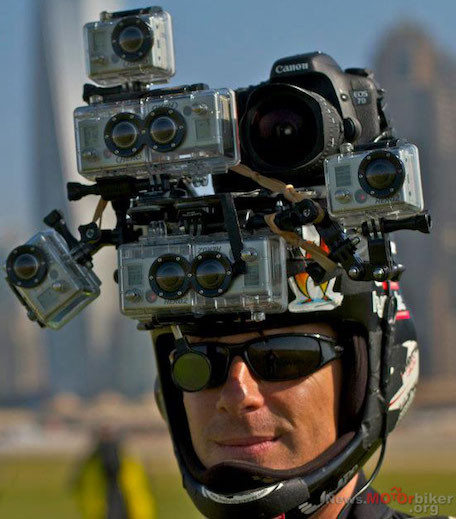You may have just had a crash or been spotted doing something illegal by the police who have pulled you over and see that you have an action camera strapped to your bike, helmet or body.
They ask for the camera or SD card, or they simply remove it.
What do you do?
Riders have been fined around the world by the self-incriminating evidence of an action camera.
In January 2016, a 60-year-old British motorcyclist was sentenced to two years’ jail for dangerous driving based on evidence from his helmet camera SD card.
In another UK case, a rider dumped the SD card, but it was later found by police in a tunnel. He and several of his companions were later taken to court and fined and even banned from riding for a number of traffic offences.
There have also been several cases of Australian riders being fined for evidence collected from confiscated cameras and SD cards.
Police powers
Police can legally ask for your camera and SD card if they “reasonably suspect” it could contain evidence a minor traffic or serious offence has been committed.
A crash is a good example of where police might exercise their right to collect relevant evidence.
In some places, such as America, police may first have to obtain a search warrant. In Australia, they don’t.
Without wishing to pervert the course of justice, we suggest you extract the SD card or at least turn off your camera to avoid attracting the attention of the police.
If they see the camera is off or that the SD card is missing, they might just assume you weren’t recording.
However, we do not suggest you lie and say you don’t have it or that it wasn’t recording. That’s a whole other offence.
Even if you want to use the evidence later in your defence, your lie will then be obvious and police could charge you for providing false information.
If they ask for the camera or card, you can politely tell the police you will gladly make it available after it is copied.
That may not work, unless you have been syrupy sweet.
Don’t be obstinate. That could be seen as refusing to hand over evidence and you could be charged with obstructing a police officer in the execution of their duty.
That would result in a court appearance where you could cop a fine of a few hundred dollars,
The proper procedure is to let them take it and then challenge it in court. But, of course, the horse has already bolted.
Another legal opinion
However, one legal advisor suggest that would offend the right to not incriminate yourself.
“But there is the law and there is reality,” he notes. “Coppers will usually do whatever is easiest to ‘prove’ an offence. If that entails bullying a motorist into handing over an SD card, that is what the coppers will do.”
If your camera or SD card has been confiscated by the police or handed over to them, ask the officer to make a note of it.
Police must supply you with a receipt of the item as “soon as possible”. It must also be returned to you in 30 days unless it is to be used as evidence. In that case, police have to apply for an extension through court.
If the matter goes to court, your legal representative can also ask for the card or, at least, a copy to be supplied for your use as evidence.
Incriminating evidence
But here’s the scary thing: It’s not just your SD card that could incriminate you.
As bikes become more technologically advanced, their ECU or data recorder could also supply vital information to police.
They can also obtain incriminating evidence from your GPS or even various smartphone apps that track your ride.
Please note:
- This article is based on several other articles already published on Motorbike Writer as well as information from police and lawyers, including East Coast Lawyer Tina Davis and assistant Robyn Temperton. It is not legal advice. For legal advice, you should engage the services of a lawyer.
- If you have any further questions about your legal rights, Tina says you are welcome to email her or contact her at 1300 720 544.
- Since the law can be challenged and is open to legal interpretation, you may disagree with many of the points raised here. Please feel free to comment in the “Leave a reply” section below.





